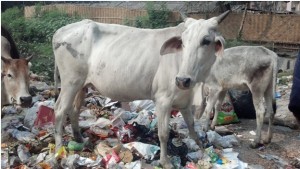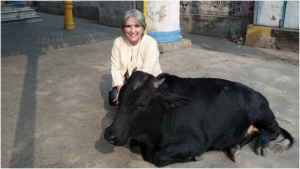This is my fourth week in Kolkata (Calcutta), and I’m sopping up every precious minute.
I work at the Banerji Homeopathy Clinic and Research Center from about 10 a.m. until 9 p.m. Monday through Saturday, but Sundays are for touring and getting to know Kolkata.
It’s an exciting beehive of a place, where life endlessly pokes at the senses.
Foods are prepared from scratch on the street, rickshaws tote people, dogs roam the alleyways and cows meander nearby.
From what I can gather, Indian cows are a breed called zebus. The only reason I know this is because when our boys were little, we had a picture book of exotic animals with a large photo of a zebu. Thus, “zebu” became one of the first words our son learned.
Hearing him pronounce the word made us laugh at the time, and now that I see these creatures on the streets of Kolkata, it makes me want to repeat the word again and again.
Zebu.
Zebus have stick-out ears, a hump of sorts on their backs and give milk with plenty of cream. But most importantly for India, they are one of the only cattle species able to contend with oppressive heat.
In Kolkata, Zebus often live on the side of the road … not the countryside, but in the city, on sidewalks and in front of buildings. Their lifestyle gives new meaning to free-range.

This one stands in what looks like rubble but is being fed food scraps from the woman’s gatherings and what some call “land scraps.”
That would be coconut bits, cauliflower tops and anything that remains edible because just like small farmers all over the world, the family depends on their cow for food.
Here’s a zebu taking an afternoon break in the middle of the noisy, bulging street. I couldn’t resist having my photo taken with her.

She lives in front of a temple. Again, no grass, but she appears to be content and healthy.
Sadly, milk in the stores in Kolkata is not much different than that in most parts of the United States. It’s ultra-pasteurized, packaged in aseptic containers and presented in the cold section as well as on non-refrigerated shelves.
Yet fresh zebu milk is available if sought out. Our driver tells me that his wife gets theirs from a cow on the next block over … in the city.
She carries a bucket to the cow owner in the morning at a designated time, waits while the cow is milked directly in her bucket, pays her rupees, then carries it home. From that, she makes paneer, ghee and yogurt.
He says this is a better way to get milk because his wife knows that the milk hasn’t been diluted with water.
In Kolkata, everywhere I look, people are making things happen.
Building, carrying, tending, selling, cooking.
The Indian way is enterprising, resourceful, making the best of a sometimes difficult situation and, from what I can see, rarely complaining.
The zebu seems to be of the same disposition. She does what she’s supposed to do. Scavenge, munch, give milk and rest.
It may not be the ideal setting, but the Kolkata way is to make it work, regardless of circumstances.
We in the West would do well to adopt some of those ways ourselves.
We should become more Kolkata-like.
Maybe a better way to put it is … zebu-ish.



I love hearing about your adventures! It seems that in a way we have gotten quite lazy and spoiled in America. Do we’ve forgotten how to be resourceful and grateful!
Interesting. Thank you for telling about Zebu cows in India. I was in India a few years ago and liked seeing the cows. See my blog: Travel Notes from India on Silicon, Cows, and Soil Fertility
http://hartkeisonline.com/2010/03/18/soil-scientist-travels-to-india/#more-5847
This is the first time I’ve heard the name Zebu– there’s so much to learn about different parts of the world. But it’s also comforting to know that their traditional foods aren’t that much different from ours!
This is really interesting. Today I received Countryside magazine and saw an article about miniature Zebus and having them as a miniature milking cow for the family farm.
Brava Joette! Your blog and emails are so sensitive and enthralling! Thank you!
I always enjoy your blogs. I would love to visit India myself someday…Who knows?
Zebu…never heard of that word. Great blog. All so exciting.
Loved the video of you talking with the Zebu. It seemed she was looking for a friendly scratch there at the end when she surprised you and you started laughing. I laughed so hard…a new Steve Irwin in the making..
I love hearing about the traditions and ways of life of those in other countries. We have much to learn of the food and resourcefulness!
Zebu…that is a great name. Thanks for the great story, Joette. Keep ’em coming!
Hearing your stories, I am even more thankful for the blessings we have here in the states, though I do think we take if for granted!